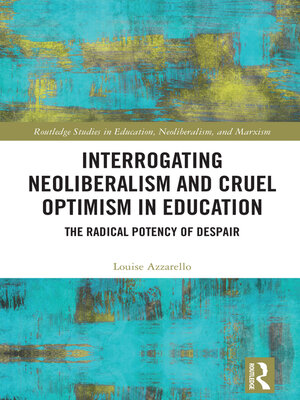Interrogating Neoliberalism and Cruel Optimism in Education
ebook ∣ The Radical Potency of Despair · Routledge Studies in Education, Neoliberalism, and Marxism
By Louise Azzarello

Sign up to save your library
With an OverDrive account, you can save your favorite libraries for at-a-glance information about availability. Find out more about OverDrive accounts.
Find this title in Libby, the library reading app by OverDrive.



Search for a digital library with this title
Title found at these libraries:
| Library Name | Distance |
|---|---|
| Loading... |
This book is a philosophical examination of the ways in which neoliberalism underpins and impedes public education. It proposes that education's adoption of neoliberal logic generates a sense of despair amongst educators, who often enter the profession with the hope of building a better, more just world.
Drawing on the author's 27 years of experience as a secondary classroom teacher and engaging with a range of theoretical concepts, cultural objects, and scenes of violence from her time in the classroom, The Radical Potency of Despair renders visible the ongoing harms that neoliberal logic creates for education and educators. The author proposes a new "ruptured fantasy of education" and suggests that it is not hope that ignites educators who keep fighting for education, but rather despair. Despair is conceived of as a generative force, provoking educators to hold time and space open for pedagogical encounters that interrupt the ongoing instrumentalization of education. The author further conceptualizes a notion of thinking with images as a pedagogical interruptive force. Thinking with images, she argues, gives students time and space to attend to what they see, thus affording them the chance to think differently about the violence of modern society. Such pedagogical interruptions are presented as a refusal of the normative order of education, countering present infrastructures that aim to constrain and instrumentalize education.
A compelling and original volume, it will appeal to scholars, researchers, and upper-level students with interests in neoliberalism and education, the philosophy of education, critical pedagogy, and educational policy and politics.







